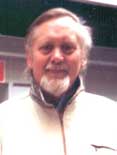|
 |
James Graham Interview

James Graham
|
James Graham  was a teacher for over thirty years. Before he retired, he began writing poetry. He has been published in
The Dark Horse, edited by Gerry Cambridge; Edinburgh University Press; The Centre for Contemporary Arts,
and Ragged Raven Press. His first collection, When Certain Fruits Were Ripe, was published in 2002 by the National Poetry Foundation.
He is the WriteWords Poetry Writers' Group Leader.
was a teacher for over thirty years. Before he retired, he began writing poetry. He has been published in
The Dark Horse, edited by Gerry Cambridge; Edinburgh University Press; The Centre for Contemporary Arts,
and Ragged Raven Press. His first collection, When Certain Fruits Were Ripe, was published in 2002 by the National Poetry Foundation.
He is the WriteWords Poetry Writers' Group Leader.
How did I get into writing poetry? It’s so long ago I can’t remember! It was something to do with the heady cultural milieu of Glasgow University.
Poets I very much admire; Shelley, who shows that you can write passionately about
abstractions such as Beauty and Liberty without turning the reader off; Pablo Neruda, for being
a great poet of the oppressed and dispossessed, and for mindblowing imagery, and Elizabeth Bishop,
for showing how the personal can be universal. But the two poets I absolutely love are Blake (‘How can the bird that is born for joy/ Sit in a cage and sing?’) and
Whitman (‘I sound my barbaric yawp over the roofs of the world’).
Both are all-round dissidents and both show you how freely you can write, free of the tyranny
of rhyme and even metre. They’re the only two I think I’ve actually imitated and quoted in my own work.
Most ideas really do seem to come unbidden, on waking or at a supermarket checkout. A visitation by the Muse. But there’s a pattern in the way I make poems; write it in prose first, to get the content sorted. Since I’m aware that this prose is going to become verse, it usually begins to fall into a rhythym. Leave to simmer for a few days- sometimes a few years in my case; Bishop also left poems unfinished for years. Sooner or later, put the ideas into verse. With the more awkward poems, revise and revise- not all at once, over a period of time. Even after they’ve been published- if I’m lucky enough to have a poem published twice, it will usually have changed in the meantime, anything from a word here and there to a reworking. I always have a handful of poems in various stages of incompleteness.
I get blocked in the writing of one ongoing poem. Very much so. But I try to keep several plates spinning, including prose work- mainly articles- so if one thing gets blocked there’s always something else.
I’m a sucker for
... sign up to WriteWords to read more
|
Comments by other Members
| |
No comments at present.
To post comments you need to become a member. If you are already a member, please log in .
 
Comments:
This work can only be commented on by group members.
|
|
|
|



 Comments by other Members
Comments by other Members


